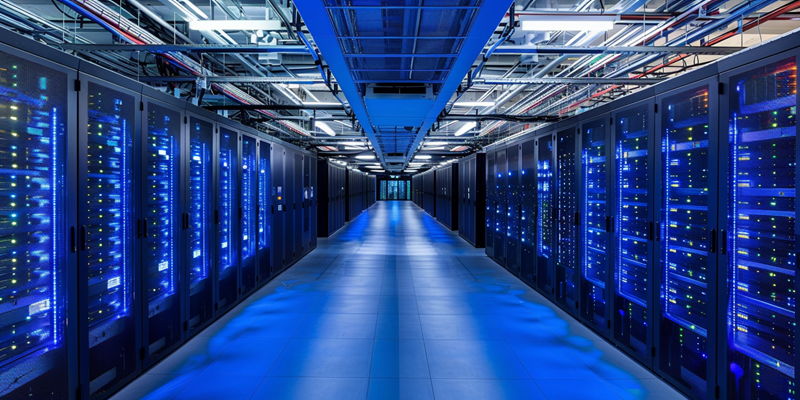The small community of Benton Township in Michigan is abuzz with the substantial economic prospects brought forth by a proposed AI data center. An enigmatic company eyes a 280-acre plot near Lake Michigan College to construct this $3 billion technological hub. This particular site is strategically chosen for its proximity to the Cook Plant’s significant energy provisions and the regional water sources necessary for the facility’s cooling systems. Bringing such an advanced project to fruition would not only revolutionize the town’s economic status but also potentially place it on the map as a pivotal node in the ever-expanding field of artificial intelligence infrastructure. Officials and citizens alike are optimistic, as the project promises a transformative effect on the township’s future, with implications that reach far beyond its borders.
The Impact on Local Economy
Benton Township is poised for an economic renaissance with the announcement of a major AI data center investment. This development has generated enthusiasm among regional leaders, with Berrien County’s Chokwe Pitchford and State Representative Joey Andrews expressing confidence in the job creation and economic stimulation potential. This project doesn’t just promise immediate jobs; it heralds an era of high-tech advancement as it meets the increasing needs of the artificial intelligence sector. The anticipated economic ripple effect could very well transform the region into a tech-forward hub, marking a noteworthy advance in local industry capabilities. With such investment, the township could see a robust enhancement of its economic landscape, promising prosperity and technological progress for the community.
Legislative Challenges and Support
The Need for Legislative Approval
To bring the concept of an advanced AI data center to life, overcoming legislative barriers is a crucial step. This initiative hinges on extending vital tax breaks that are set to expire in 2035. To achieve this, lawmakers are considering critical legislation through Senate Bills 237 and 238, along with their House counterparts, Bills 4905 and 4906.
These legislative proposals aim to push the expiration date of these financial incentives to 2050. This extension is a linchpin for assuring the economic feasibility of the data center, ensuring that the project has the financial support it requires to thrive. Such legislative action is imperative for the successful establishment and longevity of the data center, making it a focal point of attention for supporters and legislators working to realize the transformative potential of this groundbreaking infrastructure.
Tax Incentives: A Contested Subject
In Michigan, the strategy to attract tech giants through generous tax incentives is sparking debate among lawmakers. Tax breaks are seen by some as a necessary bait for big data center investments but not all agree. Democratic Rep. Yousef Rabhi stands as a prominent critic, condemning these incentives as a form of “corporate cronyism,” illustrating the divide within the state’s legislative body on wooing tech firms. Despite such internal resistance, the federal government’s recent move to revive the Palisades nuclear plant by providing a hefty loan suggests a broader political readiness to support advanced tech initiatives in Michigan. This action may be part of a larger drive to create a favorable environment for high-tech investments, speaking to the complex interplay between local opposition and overarching federal support.
Michigan’s Path in the Data Center Market
Current Market Presence
In the landscape of the data center arena, Michigan may not be the giant amongst its competitors, but it stands its ground with noteworthy establishments. Leading the charge, Switch brings big-name recognition to Michigan, complemented by the operations of smaller yet critical contributors like 365 Data Centers, Bedrock Data Center, and Sentinum. Together, these companies create a solid base in a sector that’s evolving and fiercely contested.
Michigan’s existing infrastructure and these companies’ presence pave the way for future growth and attract attention for major potential projects. An example of such an opportunity is the potential development of a new artificial intelligence data center, signifying a leap forward for the state’s role in the data center industry. This ensemble not only underscores Michigan’s current status but also signals the readiness for an uptick in data-driven investments. Thus, while not yet a titan, Michigan’s data center industry holds a place of strategic promise within the high-stakes game of data management and storage, poised for expansion and innovation.
The Potential for Growth
Pending legislative approval, Michigan stands on the cusp of a technological leap with a proposed $3 billion AI data center. This venture has the capacity to catapult the state into a leadership role within the data center sector, underscoring Michigan’s emergence as a hub for tech innovation and economic vitality. The sheer size and ambition of this project reflect Michigan’s economic vision, positing the state as a key player in technology on both national and international stages. The data center isn’t just a boon for local growth; it’s a strategic move to anchor Michigan’s future economy in the high-stakes world of tech infrastructure. The successful realization of this project could redefine Michigan’s industrial identity, fusing it with the digital age, and turning it into a magnet for tech talent and investment, reshaping the state’s economic landscape for decades to come.

